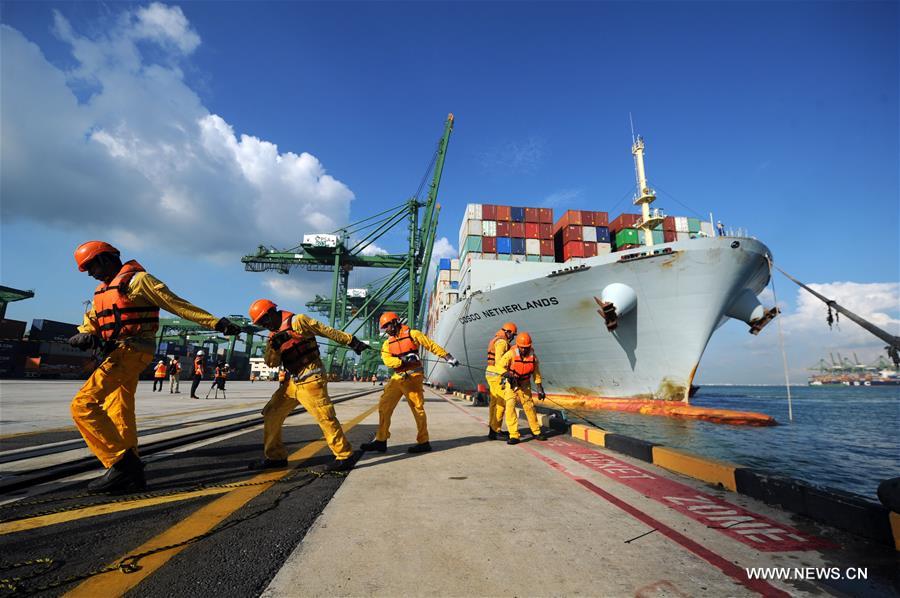On ancient route linking Southeast Asian countries, a symbolic vovage by COSCO vessel
- Yan Liang, Lim Wen Xin
 0 Comment(s)
0 Comment(s) Print
Print E-mail Xinhua, April 24, 2017
E-mail Xinhua, April 24, 2017
Merchant Vessel (M.V.) COSCO Netherlands berths at Singapore's Pasir Panjang terminal, on April 23, 2017. Merchant Vessel (M.V.) COSCO Netherlands arrived at port of Singapore on Sunday morning after sailing more than 3,800 km from east China in a voyage aimed at cementing a traditional friendship between China and Southeast Asian countries. (Xinhua/Then Chih Wey)
by Yan Liang, Lim Wen Xin
SINGAPORE, April 23 (Xinhua) -- Merchant Vessel (M.V.) COSCO Netherlands arrived at port of Singapore on Sunday morning after sailing more than 3,800 km from east China in a voyage aimed at cementing a traditional friendship between China and Southeast Asian countries.
After departing from Ningbo in east China's Zhejiang Province on Tuesday afternoon, M.V. COSCO Netherlands had been sailing non-stop at a speed of about 35 km per hour, for four days and five nights.
With flocks of seabirds flying over the deck on the South China Sea, M.V. COSCO Netherlands is travelling on a route that can date back to China's Han Dynasty (206 B.C.-220 A.D.), the time when ancient Chinese and peoples of Southeast Asian countries began trading with each other, along with progress in ship-building and navigation technologies.
Hence, litoral regions in ancient China including Guangzhou in south China's Guangdong Province, Quanzhou in southeast China's Fujian Province and Ningbo built a harmonious relationship with Southeast Asian countries. An ancient maritime Silk Road thus witnessed numerous mutually beneficial tradings and people-to-people exchanges.
Nowadays, inter-connectivity between China and Southeast Asian countries is still improving, with facilitation by voyages of oceangoing container vessels like M.V. COSCO Netherlands of China Ocean Shipping (Group) Company, and with promotion by the Belt and Road Initiative China proposed in 2013.
The Belt and Road Initiative consisting of the Silk Road Economic Belt and the 21st Century Maritime Silk Road aims to build a trade and infrastructure network connecting Asia with Europe and Africa along the ancient Silk Road routes.
During its stay of less than 12 hours in Singapore, M.V. COSCO Netherlands will take additional cargo bound for Europe after discharging goods for Singapore, with a load to total 11,763 TEU (20 feet equivalent unit), before continuing the voyage that will last 40 days, said Li Hongbing, chief officer of M.V. COSCO Netherlands.
"At present, COSCO Shipping owns 56 affiliated companies in 12 countries across the Southeast Asian and South Asian regions, with a total of more than 2,200 employees, but of which only 100 are Chinese. It contributes much to the local labor market and economic development," Gu Jinsong, president of Singapore-based COSCO Shipping (Southeast Asia) Corporation Limited, told Xinhua.
With its outstanding logistic and transportation infrastructure and performance, the city state of Singapore is perhaps one of the most important links for China's 21st Century Maritime Silk Road, said Lim Tai Wei, senior lecturer with Singapore University of Social Sciences.
Singapore's experiences in the shipping industry, its common law system and strong corporate governance and practices, among others, are all attractive points of Singaporean companies for Chinese companies to make them partners in reaching out to the rest of Southeast Asia and beyond, Lim said.
"China's contribution to Southeast Asian countries is not only increasing inter-connectivity in the maritime areas, but also internally within countries, to connect different regions and provinces," Lim said.
"In other words, the Belt and Road Initiative may actually be able to unite both maritime and overland Southeast Asia. This can increase logistic and transportation efficiency, particularly since the region has economic community aspirations," Lim explained.
From China to Southeast Asia, the ever-extending maritime Silk Road is also believed to help promote cultural and people-to-people exchanges, in addition to bringing business and trade opportunities and facilitation to countries and peoples.



